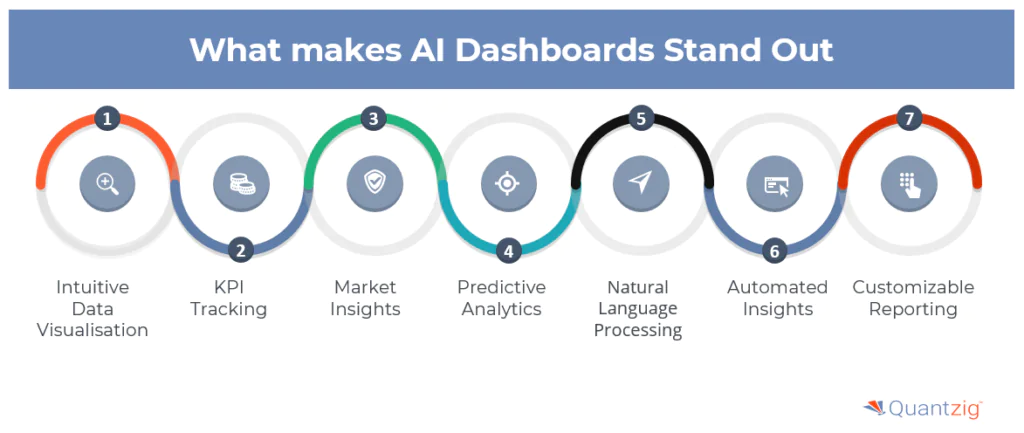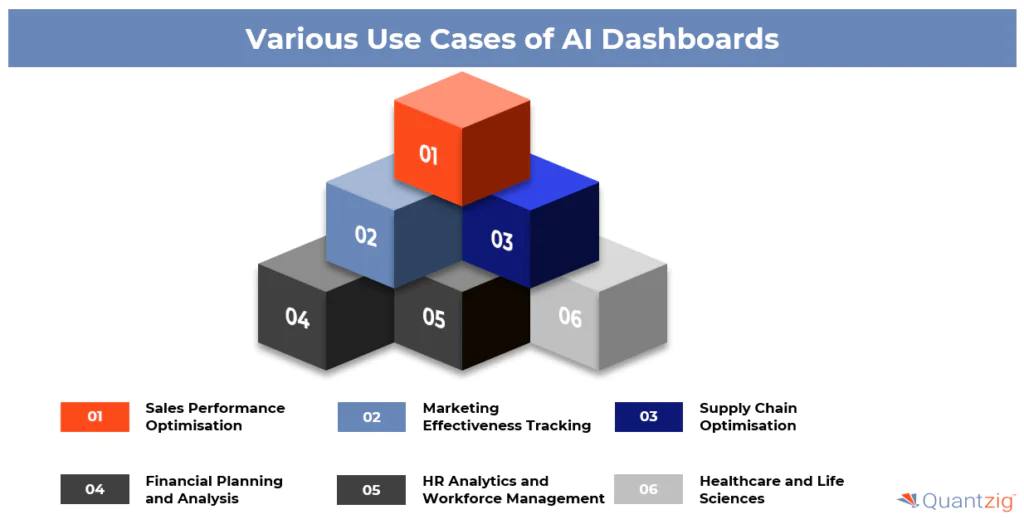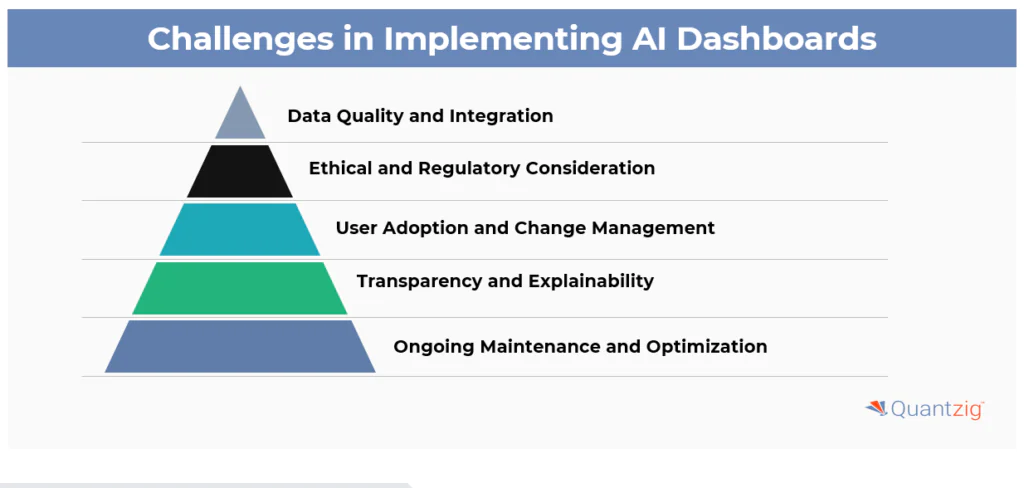Table of Contents
Artificial Intelligence Dashboards: Introduction
The need for real-time, actionable insights has become very important today. Traditional business intelligence (BI) dashboards, while valuable, often fall short in providing the comprehensive, AI-powered decision support that modern organizations require. Enter the era of Artificial Intelligence (AI) dashboards – a transformative approach to data visualization and analytics that is revolutionizing the way executives and decision-makers operate.
Book a demo to experience the meaningful insights we derive from data through our analytical tools and platform capabilities. Schedule a demo today!
Request a Free DemoThe Growth of Artificial Intelligence Dashboards
Conventional BI dashboards have long served as the go-to tools for data analysis and reporting. However, as the volume, variety, and velocity of data continue to grow, the limitations of these static dashboards have become increasingly apparent. Executives often find themselves overwhelmed by the sheer amount of information, struggling to extract the most critical insights and make timely, data-driven decisions.
The emergence of AI dashboards represents a significant leap forward in data visualization and analytics. By integrating advanced AI and machine learning capabilities, these next-generation dashboards are able to process and analyze vast amounts of data, identify patterns and trends, and deliver personalized, context-aware insights to users. This shift has enabled organizations to move beyond mere data presentation and towards a more proactive, intelligent decision-making framework.
Important Features of Artificial Intelligence Dashboards
In short, market trends dictate success. Harnessing machine intelligence and analyzing vast pools of unstructured data through sentiment analysis uncovers deep insights into evolving consumer preferences. These insights empower strategic decision-making by leveraging advanced analytics techniques, ultimately enhancing user experience and ensuring competitive edge.
- Intuitive Data Visualization: AI dashboards leverage sophisticated data visualization techniques, such as interactive charts, graphs, and infographics, to present complex information in a clear and engaging manner. These visuals are designed to help users quickly identify and understand key trends, outliers, and performance metrics.
- KPI Tracking: AI dashboards provide comprehensive monitoring of key performance indicators (KPIs) across various business domains, such as sales, marketing, operations, and finance. This allows executives to track the pulse of their organization and make data-driven decisions to optimize performance.
- Market Insights: By integrating external data sources, such as industry reports, social media sentiment, and competitor analysis, AI dashboards offer real-time insights into market trends, customer behavior, and competitive landscape. This information can be invaluable for strategic planning and decision-making.
- Predictive Analytics: AI dashboards leverage advanced predictive modeling and forecasting capabilities to help organizations anticipate future trends, identify potential risks, and make more informed strategic decisions. These predictive insights can inform everything from sales forecasting to resource planning and investment decisions.
- Natural Language Processing (NLP): AI dashboards often incorporate NLP technologies, enabling users to interact with the dashboard using natural language queries. This allows for more intuitive and efficient data exploration, as users can simply ask questions and receive relevant insights in response.
- Automated Insights: Generative AI dashboards can be programmed to continuously analyze data, identify significant changes or anomalies, and automatically generate personalized insights and recommendations for users. This proactive approach helps organizations stay ahead of the curve and respond to emerging opportunities or challenges.
- Customizable Reporting: AI dashboards offer the ability to create and customize reports, dashboards, and visualizations to meet the specific needs of different stakeholders, from C-suite executives to operational teams.
Advantages of Artificial Intelligence Dashboards
- Improved Decision-Making: By providing comprehensive, real-time insights and predictive analytics, AI dashboards empower executives and decision-makers to make more informed, data-driven decisions that drive business success.
- Enhanced Operational Efficiency: AI dashboards can automate various data-related tasks, such as data integration, cleaning, and analysis, freeing up valuable time and resources for organizations to focus on core business activities.
- Increased Agility: The dynamic nature of AI dashboards allows organizations to quickly adapt to changing market conditions, customer preferences, and regulatory requirements, enabling them to stay ahead of the competition.
- Reduced Risk: AI dashboards can help organizations identify and mitigate potential risks by providing early warning signals and proactive recommendations, ultimately reducing the likelihood of costly mistakes or missed opportunities.
- Improved Collaboration: AI dashboards can serve as a centralized hub for data-driven decision-making, fostering cross-functional collaboration and alignment across the organization.
- Enhanced User Experience: The intuitive, visually-appealing nature of AI dashboards, combined with natural language interaction capabilities, creates a more engaging and user-friendly experience for both technical and non-technical stakeholders.
Artificial Intelligence Dashboard Use Cases
Navigating modern business demands requires staying ahead of evolving market trends. By leveraging machine intelligence for analyzing diverse unstructured data, businesses can uncover valuable insights, such as consumer preferences through sentiment analysis. These insights drive informed strategic decision-making, enabled by advanced analytics techniques, ultimately enhancing user experience and maximizing organizational impact.
- Sales Performance Optimization: AI dashboards can provide detailed insights into sales performance, including revenue trends, pipeline analysis, and individual sales representative productivity. This information can be used to identify areas for improvement, optimize sales strategies, and enhance customer engagement.
- Marketing Effectiveness Tracking: AI dashboards can track the performance of various marketing campaigns, channels, and initiatives, enabling organizations to measure the impact of their marketing efforts and make data-driven decisions to optimize future campaigns.
- Supply Chain Optimization: AI dashboards can help organizations monitor and optimize their supply chain operations, including inventory levels, logistics, and supplier performance, to improve efficiency, reduce costs, and enhance customer satisfaction.
- Financial Planning and Analysis: AI dashboards can provide real-time financial insights, including cash flow analysis, budget tracking, and forecasting, to support strategic financial decision-making and ensure the organization’s long-term financial health.
- HR Analytics and Workforce Management: AI dashboards can help organizations analyze employee performance, talent management, and workforce planning, enabling them to make more informed decisions about hiring, training, and retention strategies.
- Healthcare and Life Sciences: In the healthcare and life sciences industries, AI dashboards can be used to track patient outcomes, monitor clinical trials, and analyze population health data to support evidence-based decision-making and improve patient care.
Expert Case Study: Enhancing Decision-Making with Quantzig’s AI-Powered Dashboards
Overview
For a leading Pharma Giant headquartered in the US, the challenge was to streamline data insights and improve the decision-making process without overwhelming executives with cluttered information. By leveraging AI-powered dashboards, we addressed this challenge, significantly improving data quality and the efficiency of decision-making.
Case Study Table
| Category | Details |
|---|---|
| Client Problem | Information Clutter with difficulty in bringing together important views without cluttering information. |
| Solutions Offered | Streamlined Decision Dashboard helped in bringing in analyzed existing dashboards to identify key data points needed and unnecessary views. Built a new dashboard in Power BI with an AI assistant for dynamic insights. |
| Impact Delivered | Improved Clarity as the decision dashboard provided clear, clutter-free views that highlighted key insights and changes, enhancing the overall decision-making process. |
Challenge faced by the Client:
The primary challenge faced by the Pharma Giant was the overwhelming amount of information cluttering their decision-making dashboards. Executives needed clear, concise views to support their insights and recommendations. Ensuring the quality of data and delivering the right types of insights were also critical factors.
AI Dashboard Solution offered by Quantzig:
To address these challenges, we developed a comprehensive Decision Dashboard using Power BI. Our approach included:
- Analysis of Existing Dashboards: We examined the current dashboards to identify essential data points and eliminate unnecessary views. This helped in focusing on the key questions executives needed answers to on a monthly and quarterly basis.
- Integration of AI Assistant: We integrated an AI assistant capable of providing dynamic insights within seconds based on user prompts. This feature allowed for real-time data analysis and insights generation.
- Customized Decision View: We created a decision view tailored for executives to easily understand changes and key insights from the past few months. This view was crucial for making informed decisions and necessary amendments.
- Benchmark-Based Automated Insights: The dashboard included automated insights based on benchmarks, ensuring high-quality data was used to support decision-making.
Impact Delivered using Quantzig Solutions:
The implementation of the AI-powered Decision Dashboard led to significant improvements:
- Reduced Information Clutter: The new dashboard provided clear, uncluttered views, highlighting key insights and changes, which enhanced the decision-making process.
- Increased Trust in Data: Executives gained confidence in data-backed decisions, knowing that the insights were accurate and of high quality.
- Enhanced Efficiency: The dashboard reduced the need for curated insights by 60% and cut down the manual effort in writing insights by 30-40%.
- Faster Decision-Making: The AI assistant and dynamic insights expedited discussions on gaps and necessary amendments, leading to quicker, more informed decisions.
This case study demonstrates how leveraging AI-powered dashboards can transform decision-making processes, providing clear, high-quality insights and significantly improving efficiency.
Challenges and Incorporations for AI Dashboards Integration in BI
While the benefits of AI dashboards are numerous, there are also several challenges and considerations that organizations must address when implementing these technologies:
- Data Quality and Integration: Ensuring the accuracy, completeness, and timeliness of data is crucial for the effectiveness of AI dashboards. Organizations must invest in robust data management and integration strategies to overcome these challenges.
- Ethical and Regulatory Considerations: As AI dashboards handle sensitive data and make automated decisions, organizations must be mindful of data privacy, security, and compliance requirements, as well as the ethical implications of AI-driven insights.
- User Adoption and Change Management: Successful implementation of AI dashboards requires a well-planned change management strategy to ensure user acceptance and adoption. This may involve training, communication, and ongoing support to help users understand the value and capabilities of the technology.
- Transparency and Explainability: As AI-powered insights become more prevalent, there is a growing need for transparency and explainability in the decision-making process. Organizations must be able to clearly articulate how the AI algorithms arrive at their recommendations to build trust and confidence among stakeholders.
- Ongoing Maintenance and Optimization: AI dashboards require continuous monitoring, maintenance, and optimization to ensure they remain relevant and effective in the face of evolving business needs and changing market conditions.
Experience the advantages firsthand by testing a customized complimentary pilot designed to address your specific requirements. Pilot studies are non-committal in nature.
Request a Free PilotThe Components of AI Data Visualization and Dashboards for Automated Marketing Insights
At the core of AI dashboards are the principles of effective data visualization and dashboard design. By leveraging advanced data visualization techniques, organizations can present complex information in a clear, intuitive, and engaging manner, enabling users to quickly identify patterns, trends, and insights.
Natural Language Generation (NLG)
One of the key features of AI dashboards is the integration of Natural Language Generation (NLG) technology. NLG allows the dashboard to automatically generate personalized, contextual narratives that explain the insights and recommendations presented in the visualizations. This helps to bridge the gap between data and decision-making, making the information more accessible and actionable for users.
Natural Language Querying (NLQ)
Another important aspect of AI dashboards is the integration of Natural Language Querying (NLQ) capabilities. NLQ enables users to interact with the dashboard using natural language, allowing them to ask questions and receive relevant insights without the need for complex data queries or technical expertise.
Predictive Analysis Decision Dashboard
AI dashboards leverage advanced predictive analytics and advanced ai solutions to forecast future trends, identify potential risks, and provide recommendations to support strategic decision-making. By incorporating machine learning algorithms and statistical modeling, these dashboards can help organizations anticipate and prepare for changes in the market, customer behavior, and other key business drivers.
Get started with your complimentary trial today and delve into our platform without any obligations. Explore our wide range of customized, consumption driven analytical solutions services built across the analytical maturity levels.
Start your Free Trial TodayConclusion
The rise of Artificial Intelligence dashboards represents a transformative shift in the way organizations approach data-driven decision-making. By integrating advanced AI Assistant for Insights and machine learning capabilities, these next-generation dashboards are empowering executives and decision-makers to make more informed, agile, and strategic choices that drive business success.
As the volume and complexity of data continue to grow, the need for comprehensive, real-time insights has become increasingly critical. AI dashboards address this need by providing intuitive data visualization, KPI tracking, market insights, predictive analytics, and automated recommendations – all within a user-friendly, customizable platform.
By embracing the power of AI dashboards, organizations can unlock new levels of operational efficiency, risk mitigation, and strategic agility, ultimately positioning themselves for long-term success in an ever-evolving business landscape.








